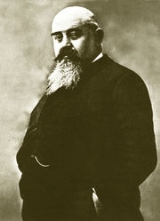
Giuseppe Giacosa
Overview
Poet
A poet is a person who writes poetry. A poet's work can be literal, meaning that his work is derived from a specific event, or metaphorical, meaning that his work can take on many meanings and forms. Poets have existed since antiquity, in nearly all languages, and have produced works that vary...
, playwright
Playwright
A playwright, also called a dramatist, is a person who writes plays.The term is not a variant spelling of "playwrite", but something quite distinct: the word wright is an archaic English term for a craftsman or builder...
and librettist
Libretto
A libretto is the text used in an extended musical work such as an opera, operetta, masque, oratorio, cantata, or musical. The term "libretto" is also sometimes used to refer to the text of major liturgical works, such as mass, requiem, and sacred cantata, or even the story line of a...
.
He was born in Colleretto Parella, now Colleretto Giacosa
Colleretto Giacosa
Colleretto Giacosa is a comune in the Province of Turin in the Italian region Piedmont, located about 40 km north of Turin. As of 31 December 2004, it had a population of 624 and an area of 4.6 km²....
, near Turin
Turin
Turin is a city and major business and cultural centre in northern Italy, capital of the Piedmont region, located mainly on the left bank of the Po River and surrounded by the Alpine arch. The population of the city proper is 909,193 while the population of the urban area is estimated by Eurostat...
. His father was a magistrate. Giuseppe went to the University of Turin
University of Turin
The University of Turin is a university in the city of Turin in the Piedmont region of north-western Italy...
, studying in the University of Turin, Faculty of Law
University of Turin, Faculty of Law
The University of Turin, Faculty of Law is the law school of the University of Turin . The faculty of law is elsewhere called the Law Department of the University of Turin...
. Though he gained a degree in law, he did not pursue a legal career.
He gained initial fame for his play Una Partita a Scacchi ("A Game of Chess") in 1871. His main field was playwriting, which he accomplished with both insight and simplicity, using subjects set in Piedmont and themes addressing contemporary bourgeois values.
Unanswered Questions

